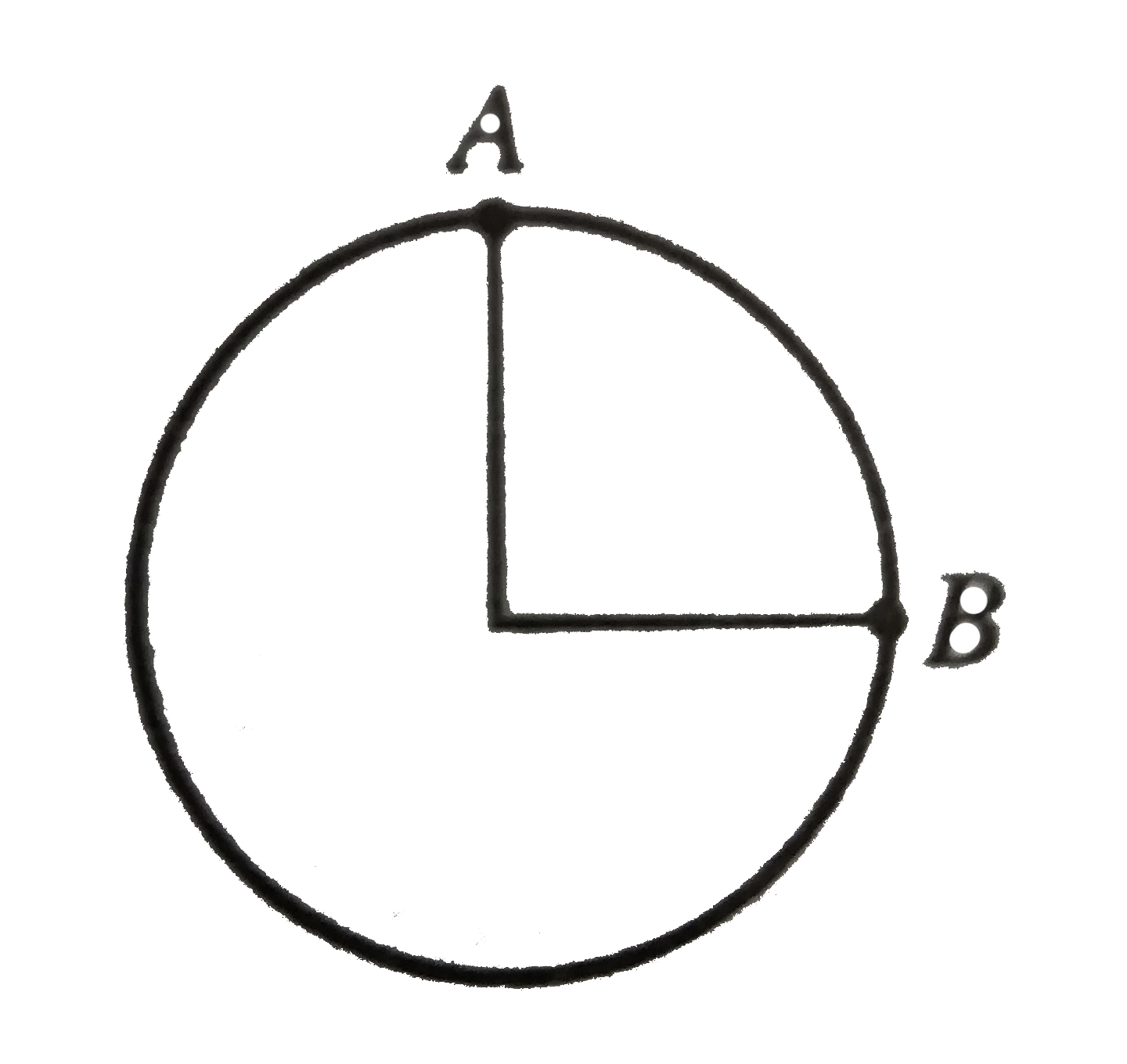A particle of mass m is moving in a horizontal circle of radius r, under a centripetal force equal to (−K/r2), where k is a constant. The total energy of the particle is -
−kr
−k2r
k2r
2kr
The correct Answer is:B
To solve the problem of finding the total energy of a particle moving in a horizontal circle under a given centripetal force, we can break it down into a series of steps.
1. Identify the Given Information:
- Mass of the particle: m
- Radius of the circle: r
- Centripetal force: F=−kr2, where k is a constant.
2. Relate Centripetal Force to Velocity:
The centripetal force acting on the particle can also be expressed in terms of its velocity:
F=mv2r
Setting the two expressions for force equal gives:
mv2r=−kr2
3. Solve for Velocity v:
Rearranging the equation to find v2:
mv2=−kr⟹v2=−kmr
Since v2 must be positive, we take the absolute value:
v2=kmr
4. Calculate Kinetic Energy KE:
The kinetic energy of the particle is given by:
KE=12mv2=12m(kmr)=k2r
5. Find Potential Energy PE:
The potential energy can be found using the relationship between force and potential energy:
F=−dudr
Thus, we can express potential energy as:
PE=−∫Fdr=−∫−kr2dr
Evaluating the integral:
PE=∫kr2dr=(−kr)=−kr+C
Assuming the potential energy at infinity is zero, we have:
PE=−kr
6. Calculate Total Energy E:
The total energy is the sum of kinetic and potential energy:
E=KE+PE=k2r−kr
Simplifying this expression:
E=k2r−2k2r=−k2r
Final Answer:
The total energy of the particle is:
E=−k2r
- Mass of the particle: m
- Radius of the circle: r
- Centripetal force: F=−kr2, where k is a constant.
The centripetal force acting on the particle can also be expressed in terms of its velocity:
F=mv2r
Setting the two expressions for force equal gives:
mv2r=−kr2
Rearranging the equation to find v2:
mv2=−kr⟹v2=−kmr
Since v2 must be positive, we take the absolute value:
v2=kmr
The kinetic energy of the particle is given by:
KE=12mv2=12m(kmr)=k2r
The potential energy can be found using the relationship between force and potential energy:
F=−dudr
Thus, we can express potential energy as:
PE=−∫Fdr=−∫−kr2dr
Evaluating the integral:
PE=∫kr2dr=(−kr)=−kr+C
Assuming the potential energy at infinity is zero, we have:
PE=−kr
The total energy is the sum of kinetic and potential energy:
E=KE+PE=k2r−kr
Simplifying this expression:
E=k2r−2k2r=−k2r
The total energy of the particle is:
E=−k2r
Topper's Solved these Questions
- BOOK - NCERT FINGERTPS ENGLISHCHAPTER - WORK , ENERGY AND POWEREXERCISE - NCERT18videos
WORK , ENERGY AND POWER
- BOOK - NCERT FINGERTPS ENGLISHCHAPTER - WORK , ENERGY AND POWEREXERCISE - ASSERTION & REASON15videos
WORK , ENERGY AND POWER
- BOOK - NCERT FINGERTPS ENGLISHCHAPTER - WAVESEXERCISE - Assertion And Reason15videos
WAVES
Similar Questions
A particle of mass m is revolving in a horizontal circle of radius r under a centripetal force k/r2 where k is a constant. What is the total energy of the particle ?
View SolutionA particle of mass m is moving in a horizontal circle of radius R under a centripetal force equal to −Ar2 (A = constant). The total energy of the particle is :-
(Potential energy at very large distance is zero)View SolutionIf a particle of mass m is moving in a horizontal circle of radius r with a centripetal force (−1/r2) , the total energy is
View SolutionA particle of mass m moves along a horizontal circle of radius R such that normal acceleration of particle varies with time as an=kt2. where k is a constant.
Total force on particle at time t s isView SolutionA particle of mass m moves along a horizontal circle of radius R such that normal acceleration of particle varies with time as an=kt2. where k is a constant.
Tangential force on particle at t s isView SolutionA particle of mass m moves along a horizontal circle of radius R such that normal acceleration of particle varies with time as an=kt2. where k is a constant.
Power developed by total at time T isView SolutionA particle of mass M is moving in a circle of fixed radius R in such a way that its centripetal acceleration at time t is given by n2Rt2 where n is a constant. The power delivered to the particle by the force acting on it, it :
View SolutionThe kinetic energy K of a particle moving along a circle of radius R depends upon the distance S as K=βS2 , where β is a constant. Tangential acceleration of the particle is proportional to
View SolutionA particle is moving in a circular path of radius 1 m. under the action of a centripetal force, the speed √2πms−1 of the particle is constant. Find the average of the velocity (inms−1) between A and B.
 View Solution
View Solution(a) A ball, suspended by a thread, swings in a vertical plane so that its acceleration in the extreme and the lowest positions are equal. The angle θ of thread deflection in the extreme position will be
( b) The kinetic energy of a particle moving in a circle of radius R depens on the distance covered as T=as2 , where 'a' is a constant. Find the force acting on the particle as a function of s.View Solution
